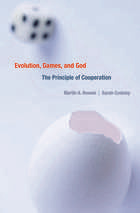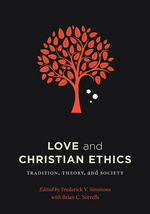
According to the reigning competition-driven model of evolution, selfish behaviors that maximize an organism’s reproductive potential offer a fitness advantage over self-sacrificing behaviors—rendering unselfish behavior for the sake of others a mystery that requires extra explanation. Evolution, Games, and God addresses this conundrum by exploring how cooperation, working alongside mutation and natural selection, plays a critical role in populations from microbes to human societies. Inheriting a tendency to cooperate, argue the contributors to this book, may be as beneficial as the self-preserving instincts usually thought to be decisive in evolutionary dynamics.
Assembling experts in mathematical biology, history of science, psychology, philosophy, and theology, Martin Nowak and Sarah Coakley take an interdisciplinary approach to the terms “cooperation” and “altruism.” Using game theory, the authors elucidate mechanisms by which cooperation—a form of working together in which one individual benefits at the cost of another—arises through natural selection. They then examine altruism—cooperation which includes the sometimes conscious choice to act sacrificially for the collective good—as a key concept in scientific attempts to explain the origins of morality. Discoveries in cooperation go beyond the spread of genes in a population to include the spread of cultural transformations such as languages, ethics, and religious systems of meaning.
The authors resist the presumption that theology and evolutionary theory are inevitably at odds. Rather, in rationally presenting a number of theological interpretations of the phenomena of cooperation and altruism, they find evolutionary explanation and theology to be strongly compatible.

At the heart of Christian ethics is the biblical commandment to love God and to love one's neighbor as oneself. But what is the meaning of love? Scholars have wrestled with this question since the recording of the Christian gospels, and in recent decades teachers and students of Christian ethics have engaged in vigorous debates about appropriate interpretations and implications of this critical norm.
In Love and Christian Ethics, nearly two dozen leading experts analyze and assess the meaning of love from a wide range of perspectives. Chapters are organized into three areas: influential sources and exponents of Western Christian thought about the ethical significance of love, perennial theoretical questions attending that consideration, and the implications of Christian love for important social realities. Contributors bring a richness of thought and experience to deliver unprecedentedly broad and rigorous analysis of this central tenet of Christian ethics and faith. William Werpehowski provides an afterword on future trajectories for this research. Love and Christian Ethics is sure to become a benchmark resource in the field.
READERS
Browse our collection.
PUBLISHERS
See BiblioVault's publisher services.
STUDENT SERVICES
Files for college accessibility offices.
UChicago Accessibility Resources
home | accessibility | search | about | contact us
BiblioVault ® 2001 - 2024
The University of Chicago Press









